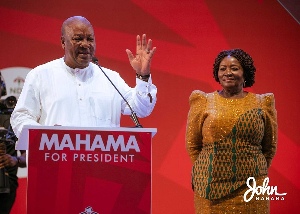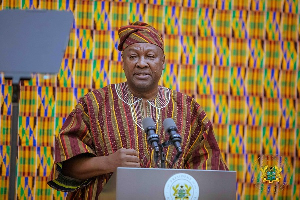I just discussed with one of my colleagues and we were wondering about the near absence of the National Commission for Civic Education (NCCE) that was established by the National Commission for Civic Education Act, 1993 (Act 452) to help develop among the citizenry a culture of democracy through awareness creation, sensitization and participation. The NCCE has been at the frontline promoting the ideals of democracy in Ghana, including normative human rights. In terms of its core mandate of providing civic education, it is not a novel institution in Ghana. Since the formation of states in pre-colonial Ghana (then Gold Coast), there have been creative and improvised ways of broadcasting power and decentralising information. Consequently, whether through the dawn broadcaster, griots or the gongon beater, there have always been improvised ways of getting people informed about governmentality.
Information is critical to any administration. As humans, we function based on the information at our disposal. Whether through the prism of evolution or creationism, there is no denying that information is conditio sine qua non to group living and survival. The gregariousness of human beings is such that we connect based on the information we have. We also split into units based on information. In effect, whether through misinformation or disinformation, our actions and inactions are wired to what we hear and what we know. The centrality of information is also because of the human penchant to tell stories. Stories are the oil that lubricates our ability to cohere peacefully in the same polity. Our imaginations, fairies, taboos, beliefs, and myths are also condensed in the stories we tell. The stories constitute information.
The world is at crossroads. We are fighting an (in)visible enemy that is so menacing that many of us struggle to pronounce its name. This enemy, Coronavirus (COVID-19), is transnational and trans-local. The rapidity in its spread is such that to hold it down seems to defy all the technologies humans have known since the industrial revolution of the 1730s. In my conversations with some of the older generation (60-65), they all tell me what is happening is unprecedented. But while viral pandemic is not new in human history, (considering that the world registered influenza in 1919 after the end of World War I), what is new is that the current COVID-19 defies the logic of technology and puts the same technology on a contradictory tangent. On the one hand, we are deploying technology to fight it; but on the other hand, technology – the means of intercontinental transportation – is easing the spread of the virus globally. Certainly, the virus has reified the globality of our world, as it challenges the core of modern technology. Sadly, the internationality of the globalised world has been stampeded by a revert to nationalism by some nations of the world, including the Brexit and the secessionist movement in Spain.
But one thing is sure that in the whirlwind of a virus that has become pandemic: information is the strongest antidote. We are either informed or deformed. Information could empower or demobilise us. Information can also be a propaganda tool to push through an agenda. Since the outbreak of the COVID-19, we have had all forms of information in circulation. There are conspiracies and half-baked truths about the virus. While this might be one of the ways the world is adjusting to this apocalyptic threat to humanity, we must be guided by a credible institution to inform our actions. This is especially because, as humans, we have confirmation biases and biases that are optimistic or pessimistic.
Since the re-democratisation of Ghana in 1992, the NCCE has been considered an important semi-autonomous state apparatus to help in consolidating Ghana’s democratic gains. But sadly, we appear not to hear the voice of the NCCE in all the brouhahas about the virus. For about a decade now, the NCCE has always cried in desperation that they are underfunded. They appeal to financial insufficiency to rationalise their inefficiency. But can’t the NCCE improvise in the technological age to meet their functions as educators? Is it not possible for the NCCE to deploy and appropriate social media to enhance their education? How much would it cost for the NCCE to go viral with information on social media – WhatsApp, Facebook etc?
Much as the NCCE, headed by Mrs Josephine Nkrumah, may be right to cry that they do not have enough funds, I hardly think it would cost so much to assemble people, representing the nine major languages of Ghana, to provide basic information about the current pandemic that has thrown the world off its axis. The information about the washing of hands, observing physical distance, identifying basic symptoms (confirmed by the WHO), eating a balanced diet, and, now, staying home should not be difficult to be recorded in the various languages in Ghana and put on social media. It should as well not be difficult to load and saturate this pluro-linguistic information on all telecommunication adverts.
We are rightly told that when the drumbeat changes, the dance step must also change. NCCE need to be creative and proactive. Elsewhere in England, nurses have saturated social media with basic information like “Stay home, save the NHS, and save lives". Please can't the NCCE emulate this or do something better than that? Whether we are happy about it or not, the world is now a virtual space with most of us becoming virtual beings. This implies that most of us operate in the virtual world through the mediation of our phones, laptops and other electronic gadgets.
Currently, there is a plethora of misinformation going on in the virtual world (social media) about the virus. In one that I listened to in Hausa (a language I speak fluently) from a young man, it was so mis-forming that I asked a friend to draw the attention of the translator of the information. But because those of us in Zongo tend to trust our leaders when they talk and even pay more attention when it is in our language, I am sure most of my people have swallowed the information hook-line-and-sinker. Language is a powerful tool. Speaking to a people in a language they speak and understand is “superpowerful”. Nelson Mandela was right in asserting that when you speak to a people in a language they understand, it goes into their head, but when you speak to them in a language they speak, it goes into their hearts.
It is about time the NCCE came to terms with the reality at hand that the world has gone virtual. They have to cease from the old excuses about lack of funds to embrace technology. It is unfortunate that in all the whirlwind about COVID-19, most of us have not heard their voices. Even if they have spoken, their voice is drowned on social media. It does not cost much to go virtual. They just have to mobilise their tech-persons and some experts in language and the virus, and everything is done. I am very sure that some Ghanaians may even provide free service to the NCCE. I provided free service to the NCCE in 2017, by educating pupils in Maamobi about Ghanaian values.
The drumbeat has changed, the dance steps must also change. Change has dawned on us. So, NCCE, please change your approach to disseminating information.
Satyagraha
Charles Prempeh (prempehgideon@yahoo.com),
African University College of Communications, Accra
Opinions of Tuesday, 31 March 2020
Columnist: Charles Prempeh















